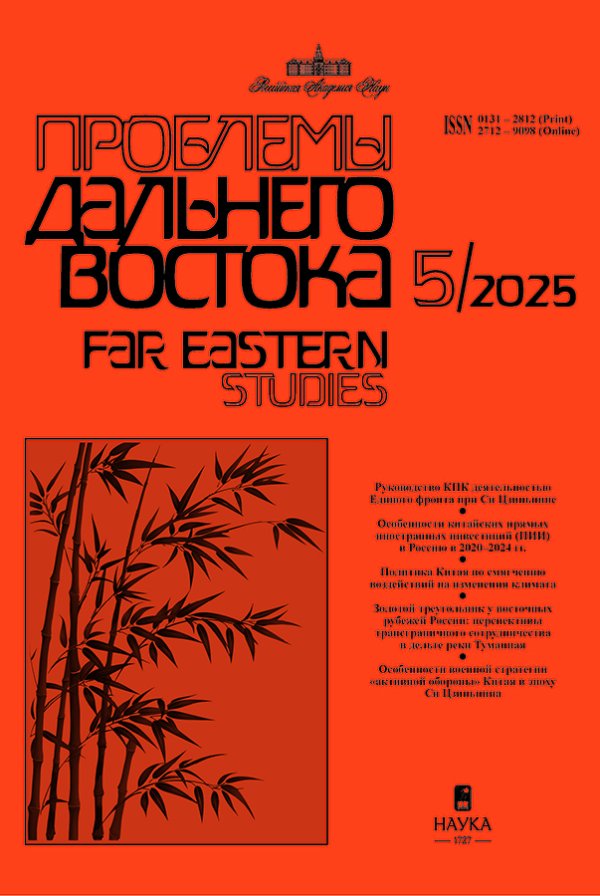Стратегические приоритеты, тенденции и перспективы участия Японии в экономической интеграции в АТР
- Авторы: Паксютов Г.Д1
-
Учреждения:
- Институт Китая и современной Азии РАН
- Выпуск: № 5 (2024)
- Страницы: 70-83
- Раздел: Экономика
- URL: https://gynecology.orscience.ru/0131-2812/article/view/676252
- DOI: https://doi.org/10.31857/S0131281224050059
- ID: 676252
Цитировать
Полный текст
Аннотация
В статье рассмотрены актуальные вызовы, стоящие перед Японией с точки зрения участия в проектах региональной интеграции. Ввиду экономических и демографических вызовов, для Японии все более важным становится взаимодействие с динамично развивающимися азиатскими экономиками, способное отчасти компенсировать нехватку трудовых ресурсов и негативную динамику спроса на внутренних рынках. Япония участвует в обоих крупнейших интеграционных проектах региона — ВРЭП и ВПТТП, но цели ее участия в каждом из проектов несколько разнятся. Так, участие в ВРЭП, лидером которого является Китай, имеет сугубо экономическую мотивацию, в то время как ВПТТП (в целом характеризующееся заметно меньшим, чем у ВРЭП, удельным весом в мировой экономике и потенциалом экономическом роста) предоставляет Токио еще и площадку для продвижения своего политического видения в сотрудничестве с дружественными странами. Проблема выбора между экономическими и политическими мотивациями в японской национальной стратегии находит свое концептуальное отражение в необходимости балансировать между азиатскими и «универсальными» ценностями, при этом в эпоху правления премьер-министра Кисида в стратегических документах заметен явный крен в сторону позиционирования Японии как страны, придерживающейся «универсальных» ценностей. В то же время новая стратегия экономической безопасности предоставляет японскому правительству экстраординарные полномочия для противостояния странам, «не разделяющим универсальные ценности». Данная тенденция обусловливается комплексом факторов, включая внутриполитические: японские элиты мотивированы удерживать и наращивать свое влияние в ситуации, когда правящая Либерально-демократическая партия сталкивается с кризисом доверия среди избирателей.
Об авторах
Г. Д Паксютов
Институт Китая и современной Азии РАН
Автор, ответственный за переписку.
Email: gpaksyutov@mail.ru
ORCID iD: 0000-0001-7153-4315
Кандидат экономических наук, старший научный сотрудник Центра японских исследований
МоскваСписок литературы
- Акимов А.В. Всеобъемлющее региональное экономическое партнерство — крупнейшее интеграционное объединение в Азии и мире // Проблемы Дальнего Востока. 2024. № 1. С. 70-83. doi: 10.31857/S0131281224010069
- Асмолов К.В., Бабаев К.В. Трёхполярный мир и блоковые треугольники в Восточной Азии // Россия в глобальной политике. 2024. Т. 22. № 3. С. 165-181. doi: 10.31278/1810-6439-2024-22-3165-181.
- Кистанов В.О. «Глобальная Британия»: курс на АТР с антикитайским уклоном // Восточная Азия: факты и аналитика. 2021. № 3. С. 6-18. doi: 10.24412/2686-7702-2021-3-6-18
- Милеев Д.А. Проблема лидерства в Восточной Азии // Азия и Африка. Взаимодействие региональных и глобальных тенденций / Хазанов А.М. (отв. ред.). М.: Институт востоковедения РАН, 2020. С. 122-141.
- Милеев Д.А. Роль Японии в Восточно-азиатском центре мировой экономики // Восточная аналитика. 2022. № 3. С. 15. doi: 10.31696/2227-5568-2022-03-008-016
- Мищенко Я.В. Япония в региональной интеграции: вызовы, задачи и перспективы // Ежегодник Япония. 2020. № 49. С. 157-174. doi: 10.24411/2687-1432-2020-10006
- Паксютов Г.Д. Экономическая активность Японии в АТР: эволюция стратегии в меняющихся условиях // Восточная Азия: факты и аналитика. 2023. № 2. С. 6-16. doi: 10.24412/2686-77022023-2-6-16
- Паксютов Г.Д. Японская стратегия экономической безопасности: секьюритизация экономического возвышения Китая? // Японские исследования. 2023. № 4. С. 6-17. doi: 10.55105/2500-28722023-4-6-17
- Панов А.Н. Внешнеполитическое наследство премьер-министра Японии Абэ Синдзо // Японские исследования. 2024. № 2. С. 21-40. doi: 10.55105/2500-2872-2024-2-21-40
- Стрельцов Д.В. Японский регионализм эпохи Синдзо Абэ через призму ценностного подхода // Мировая экономика и международные отношения. 2019. Т. 63. № 9. С. 38-49. doi: 10.20542/0131-2227-2019-63-9-38-49
- Тимонина И.Л. Япония в глобальной экономике: реалии и прогнозы XXI века // Мировое и национальное хозяйство. 2023. № 1 (61). С. 43-70.
- Fukuyama F. The End of History and the Last Man. New York: Macmillan, Inc., 1992. 464 p.
- Jones C.S. If not a clash, then what? Huntington, Nishida Kitaro and the politics of civilizations // International Relations of the Asia-Pacific. 2002. Vol. 2. No. 2. Pp. 223-243.
- Katada S.N. Gatekeeper’s Dilemma: Japan Facing CPTPP Applications from China and Taiwan // China, Taiwan, the UK and the CPTTP: Global Partnership or Regional Stand-off? Chun-yi Lee, Reilly Michael (eds.). Singapore: Springer Nature, 2023. Pp. 141-164.
- Morisato T. Japanese Philosophy and the Idea of Eurasia: A Transversal Theory of Knowledge // Eurasia: Avances de investigation. Rodrigue/ Cruz J. (ed.). Salamanca: Ediciones Universidad de Salamanca, 2021. Pp. 63-72.
- Nagy S. The IPEF: Japan’s Economic Realism and Approach to Indo-Pacific Engagement, Resilience, and Rule-Setting // The Making of the Indo-Pacific Economic Framework for Prosperity (IPEF). Palit A., Iyer R. (eds.). Tokyo: Konrad-Adenauer-Stiftung, 2023. Pp. 27-40.
- Nicita A. et al. The Regional Comprehensive Economic Partnership and its trade effects. Geneva: UNCTAD, 2021. 16 p.
- Park C.-Y. et al. Economic Implications of the Regional Comprehensive Economic Partnership for Asia and the Pacific. Manila: Asian Development Bank, 2021. 34 p.
- Seah S. et al. The State of Southeast Asia: 2023 Survey Report. Singapore: ISEAS-Yusof Ishak Institute, 2023. 60 p.
- Shin S. The Korea-Japan trade dispute: non-tariff barriers. Ames: Iowa State University, 2020. 24 p.
Дополнительные файлы








